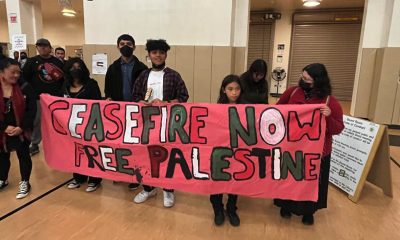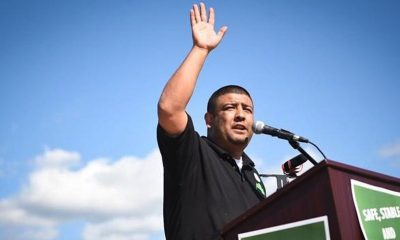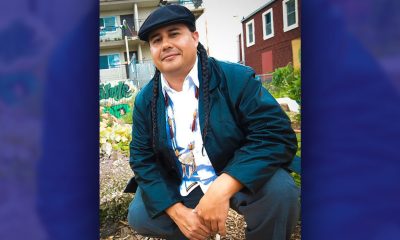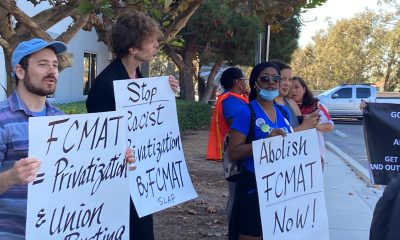Activism
How to Help Black Organizing Project’s Fight to Remove Police from OUSD
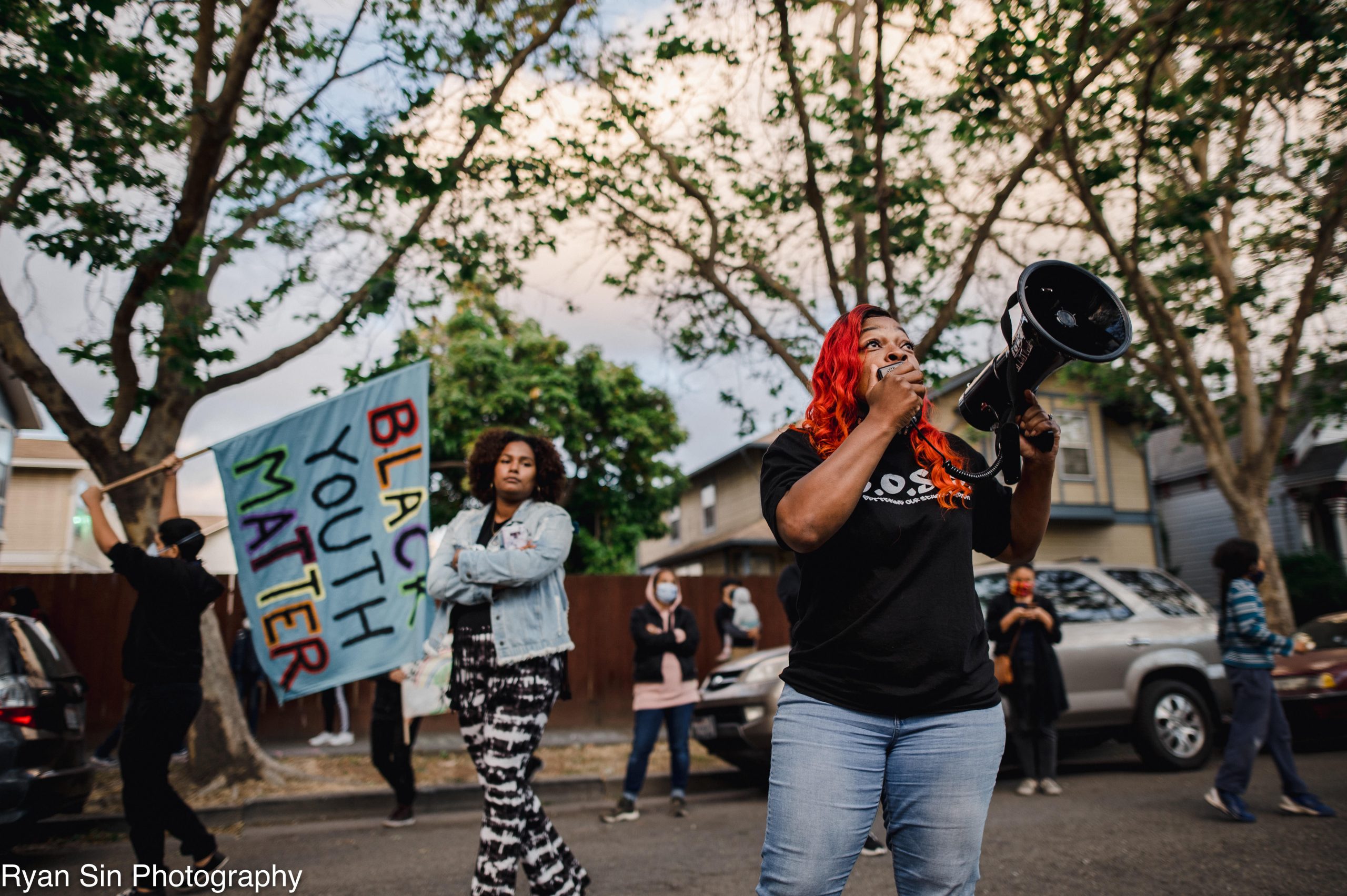
Black Organizing Project (BOP) could reach a goal on June 24 that they have worked toward since 2011: eliminating school police in Oakland’s Unified School District (OUSD), the only district in Alameda County with its own police force.
They are calling on Oakland residents to help them in their final push.
“What is it going to take for this school district to realize the murders [by police] that we are witnessing of our people in the streets are the same police who are in the schools?” asked BOP Director of organizing, Jessica Black, speaking to uproarious cheers from a crowd of around 8,000 at an Oakland protest against policing and a city and county imposed a curfew on June 3.
Black then said just three months earlier, on March 3, Oakland’s school board rejected a measure by one vote that would have drastically cut Oakland Schools Police Department’s (OSPD) budget.
Board members Amy Eng, Shanti Gonzales, and Roseann Torres voted to approve the measure, but Gary Yee, James Harris, Jody London and Jumoke Hinton Hodge voted against it.
Since police officer Derek Chauvin’s killing of George Floyd sparked protests, riots, and rebellions in Minneapolis which brought defunding and even dismantling police forces into the mainstream national conversation, BOP’s mission has found much wider, louder support.
The Oakland Education Association, Asians for Black Lives, Oakland Not for Sale, the Anti-Police Terror Project, Gender and Sexualities Alliance Network, Critical Resistance, Oakland Public Education Network and many Oakland residents, especially teachers, counselors and social workers, have been vocal in their support of BOP’s mission lately.
BOP is now calling on Oaklanders to call, e-mail, and write letters to school board members, especially the four who voted against the previous measure and OUSD Superintendent Kyla Johnson-Trammell, before the final school board meeting on June 24 to demand that they approve a new, more radical measure submitted by Torres and Gonzales called George Floyd Resolution to Eliminate OSPD.
“We can’t let off pressure,” said BOP Executive Director Jackie Byers. “We need those votes. And then on the 24th…[we need people] to get on the Zoom meeting, make public comments or speak to the agenda item.”
Readers can also submit comments during the school board meeting today, June 10.
Torres, who co-wrote the resolution, suggests people should sign up at 5:30 p.m. for public comment and then can watch the meeting or log off till 7:30 p.m. when comments can be heard.
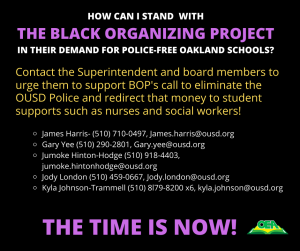
Courtesy of Oakland Education Association.
She says readers can sign up again at 5:30 p.m. on June 24 to speak at 7:30 p.m. for public comment, but they will also have the ability to speak directly to the agenda item that night.
It is unclear at this point when that agenda item will come up, but readers can link with BOP’s Facebook, Twitter or Instagram accounts for the latest info on how to help.
The bill would eliminate OSPD, removing police officers entirely from Oakland schools. It would be the culmination of a nearly decade-long battle that was sparked by the killing of Raheim Brown, Jr. on Jan 22, 2011, by OSPD Sgt. Barhim Bhatt outside of a school dance at Skyline High School. Bhatt claimed he shot Brown five times because Brown attacked another sergeant at the scene, Johnathan Bellusa, with a screwdriver. But Bellusa later claimed Bhatt may have fired unnecessarily and that OUSD prevented a proper investigation.
OSPD’s website lists that it has around 20 police officers and around 120 school security officers (SSO) but BOP says due to cuts in recent years, that number is now around 10 police officers and 60 SSOs.
All of these employees serve under Police Chief Jeff Godown, an officer who served in Los Angeles during the Rodney King riots.
SSOs have some documented history of use-of-force on minors.
In 2014, there were two separate incidents caught on camera. At Oakland High School an SSO punched a student four times who uses a wheelchair and has cerebral palsy after an altercation over the student possibly skipping class. The SSO was later convicted on one felony count of assault.
SSO officers in Fremont High School put another 15-year-old student in a chokehold, dragged him, and exchanged punches with him.
But BOP says overt acts of violence are not the only threat to students that police systems in schools pose.
Black students, especially, experience more subtle forms of damage from the punitive system that police-based models foster. While suspension rates for Black students have fallen in recent years, they still get suspended at a rate about three times higher than non-Black students.
“Black students aren’t seen in the way that white children are,” said Byers. “They’re seen as a threat from a very early age.”
Byers said the very presence of police brings trauma to Black students.
“Our students don’t feel safe when they’re around law enforcement in the way white students might feel safe,’ she said. “[They’re] constantly barraged with a reality and imagery of law enforcement murdering Black people, including young people…those images are in the psyche of Black students.”
Byers also said many Black students who live in public housing and use public transportation more often than white students are forced to interact with law enforcement constantly, as both BART and the public housing authority have their own police force.
When police are in schools as well, it becomes yet another site of trauma.
Jasmine Williams, BOP’s communications manager, said eliminating OSPD would mean eliminating all police officers and the school police chief. Funding from those cuts could be used “for hiring additional school-based counseling/mental/behavior health staff,” according to BOP’s People’s Plan for Police Free Schools.
“Counselors and therapists won’t have to rely on security to react to adolescent behavior,” said Williams.
SSOs would be retrained and transformed into peacekeepers, or school climate specialists. They would no longer wear uniforms. They have never been armed and they would continue not to be armed.
Williams said she’s heard reports from principals, teachers and students that some current SSOs have positive relationships with students and act as mentions. But the structure is not in place to encourage those relationships in a widespread way.
“If you say these people can act as mentors let’s support that and not create a punitive model,” said Williams.
Activism
Oakland Post: Week of May 21 – 27, 2025
The printed Weekly Edition of the Oakland Post: Week of May 21 – 27, 2025

To enlarge your view of this issue, use the slider, magnifying glass icon or full page icon in the lower right corner of the browser window.
Activism
OPINION: Your Voice and Vote Impact the Quality of Your Health Care
One of the most dangerous developments we’re seeing now? Deep federal cuts are being proposed to Medicaid, the life-saving health insurance program that covers nearly 80 million lower-income individuals nationwide. That is approximately 15 million Californians and about 1 million of the state’s nearly 3 million Black Californians who are at risk of losing their healthcare.

By Rhonda M. Smith, Special to California Black Media Partners
Shortly after last year’s election, I hopped into a Lyft and struck up a conversation with the driver. As we talked, the topic inevitably turned to politics. He confidently told me that he didn’t vote — not because he supported Donald Trump, but because he didn’t like Kamala Harris’ résumé. When I asked what exactly he didn’t like, he couldn’t specifically articulate his dislike or point to anything specific. In his words, he “just didn’t like her résumé.”
That moment really hit hard for me. As a Black woman, I’ve lived through enough election cycles to recognize how often uncertainty, misinformation, or political apathy keep people from voting, especially Black voters whose voices are historically left out of the conversation and whose health, economic security, and opportunities are directly impacted by the individual elected to office, and the legislative branches and political parties that push forth their agenda.
That conversation with the Lyft driver reflects a troubling surge in fear-driven politics across our country. We’ve seen White House executive orders gut federal programs meant to help our most vulnerable populations and policies that systematically exclude or harm Black and underserved communities.
One of the most dangerous developments we’re seeing now? Deep federal cuts are being proposed to Medicaid, the life-saving health insurance program that covers nearly 80 million lower-income individuals nationwide. That is approximately 15 million Californians and about 1 million of the state’s nearly 3 million Black Californians who are at risk of losing their healthcare.
Medicaid, called Medi-Cal in California, doesn’t just cover care. It protects individuals and families from medical debt, keeps rural hospitals open, creates jobs, and helps our communities thrive. Simply put; Medicaid is a lifeline for 1 in 5 Black Americans. For many, it’s the only thing standing between them and a medical emergency they can’t afford, especially with the skyrocketing costs of health care. The proposed cuts mean up to 7.2 million Black Americans could lose their healthcare coverage, making it harder for them to receive timely, life-saving care. Cuts to Medicaid would also result in fewer prenatal visits, delayed cancer screenings, unfilled prescriptions, and closures of community clinics. When healthcare is inaccessible or unaffordable, it doesn’t just harm individuals, it weakens entire communities and widens inequities.
The reality is Black Americans already face disproportionately higher rates of poorer health outcomes. Our life expectancy is nearly five years shorter in comparison to White Americans. Black pregnant people are 3.6 times more likely to die during pregnancy or postpartum than their white counterparts.
These policies don’t happen in a vacuum. They are determined by who holds power and who shows up to vote. Showing up amplifies our voices. Taking action and exercising our right to vote is how we express our power.
I urge you to start today. Call your representatives, on both sides of the aisle, and demand they protect Medicaid (Medi-Cal), the Affordable Care Act (Covered CA), and access to food assistance programs, maternal health resources, mental health services, and protect our basic freedoms and human rights. Stay informed, talk to your neighbors and register to vote.
About the Author
Rhonda M. Smith is the Executive Director of the California Black Health Network, a statewide nonprofit dedicated to advancing health equity for all Black Californians.
Activism
OPINION: Supreme Court Case Highlights Clash Between Parental Rights and Progressive Indoctrination
At the center of this controversy are some parents from Montgomery County in Maryland, who assert a fundamental principle: the right to shield their children from exposure to sexual content that is inappropriate for their age, while also steering their moral and ethical upbringing in alignment with their faith. The local school board decided to introduce a curriculum that includes LGBTQ+ themes — often embracing controversial discussions of human sexuality and gender identity.

By Craig J. DeLuz, Special to California Black Media Partners
In America’s schools, the tension between parental rights and learning curricula has created a contentious battlefield.
In this debate, it is essential to recognize that parents are, first and foremost, their children’s primary educators. When they send their children to school — public or private — they do not surrender their rights or responsibilities. Yet, the education establishment has been increasingly encroaching on this vital paradigm.
A case recently argued before the Supreme Court regarding Maryland parents’ rights to opt out of lessons that infringe upon their religious beliefs epitomizes this growing conflict. This case, Mahmoud v. Taylor, is not simply about retreating from progressive educational mandates. It is fundamentally a defense of First Amendment rights, a defense of parents’ rights to be parents.
At the center of this controversy are some parents from Montgomery County in Maryland, who assert a fundamental principle: the right to shield their children from exposure to sexual content that is inappropriate for their age, while also steering their moral and ethical upbringing in alignment with their faith. The local school board decided to introduce a curriculum that includes LGBTQ+ themes, often embracing controversial discussions of human sexuality and gender identity. The parents argue that the subject matter is age-inappropriate, and the school board does not give parents the option to withdraw their children when those lessons are taught.
This case raises profound questions about the role of public education in a democratic society. In their fervent quest for inclusivity, some educators seem to have overlooked an essential truth: that the promotion of inclusivity should never infringe upon parental rights and the deeply held convictions that guide families of different faith backgrounds.
This matter goes well beyond mere exposure. It veers into indoctrination when children are repeatedly confronted with concepts that clash with their family values.
“I don’t think anybody can read that and say: well, this is just telling children that there are occasions when men marry other men,” noted Justice Samuel Alito. “It has a clear moral message, and it may be a good message. It’s just a message that a lot of religious people disagree with.”
Justice Amy Coney Barrett raised a crucial point, noting that it is one thing to merely expose students to diverse ideas; it is quite another to present certain viewpoints as indisputable truths. By framing an ideology with the certainty of “this is the right view of the world,” educators risk indoctrination rather than enlightenment. This distinction is not merely academic; it speaks to the very essence of cultivating a truly informed citizenry.
Even Justice Elena Kagan expressed concern regarding the exposure of young children to certain materials in Montgomery County.
“I, too, was struck by these young kids’ picture books and, on matters concerning sexuality, I suspect there are a lot of non-religious parents who weren’t all that thrilled about this,” she said.
Justice John Roberts aptly questioned the practicality of expecting young children to compartmentalize their beliefs in the classroom.
“It is unreasonable to expect five-year-olds, still forming their worldviews, to reconcile lessons that conflict fundamentally with the teachings they receive at home,” he said.
As was noted in my previous commentary, “The Hidden Truth In The Battle Over Books In American Schools”, what lies at the heart of these debates is a moral disconnect between the values held by the majority of Americans and those promoted by the educational establishment. While the majority rightly argue that material containing controversial content of a sexual nature should have no place in our children’s classrooms, the education establishment continues to tout the necessity of exposing children to such content under the guise of inclusivity. This disregards the legitimate values held by the wider community.
Highlighted in this case that is before the Supreme Court is a crucial truth: parents must resolutely maintain their right to direct their children’s education, according to their values. This struggle is not simply a skirmish; it reflects a broader movement aimed at reshaping education by privileging a state-sanctioned narrative while marginalizing dissenting voices.
It is imperative that we assert, without hesitation, that parents are — and must remain — the primary educators of their children.
When parents enroll a child in a school, it should in no way be interpreted as a relinquishment of parental authority or the moral guidance essential to their upbringing. We must stand firm in defending parental rights against the encroaching ideologies of the education establishment.
About the Author
Craig J. DeLuz has almost 30 years of experience in public policy and advocacy. He has served as a member of The Robla School District Board of Trustees for over 20 years. He also currently hosts a daily news and commentary show called “The RUNDOWN.” You can follow him on X at @CraigDeLuz.
-

 Activism4 weeks ago
Activism4 weeks agoBarbara Lee Accepts Victory With “Responsibility, Humility and Love”
-

 Activism4 weeks ago
Activism4 weeks agoFaces Around the Bay: Author Karen Lewis Took the ‘Detour to Straight Street’
-

 Arts and Culture4 weeks ago
Arts and Culture4 weeks agoBOOK REVIEW: Love, Rita: An American Story of Sisterhood, Joy, Loss, and Legacy
-

 Activism4 weeks ago
Activism4 weeks agoNewsom Fights Back as AmeriCorps Shutdown Threatens Vital Services in Black Communities
-

 #NNPA BlackPress3 weeks ago
#NNPA BlackPress3 weeks agoMLK Bust Quietly Removed from Oval Office Under Trump
-

 Activism3 weeks ago
Activism3 weeks agoOakland Post: Week of May 7 – 13, 2025
-

 Activism3 weeks ago
Activism3 weeks agoOakland Post: Week of April 30 – May 6, 2025
-

 #NNPA BlackPress3 weeks ago
#NNPA BlackPress3 weeks agoTrump Abruptly Fires First Carla Hayden: The First Black Woman to Serve as Librarian of Congress




